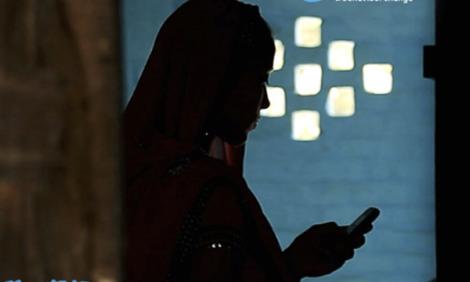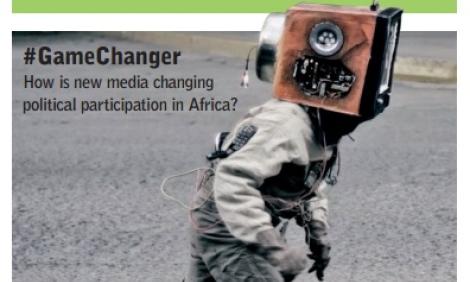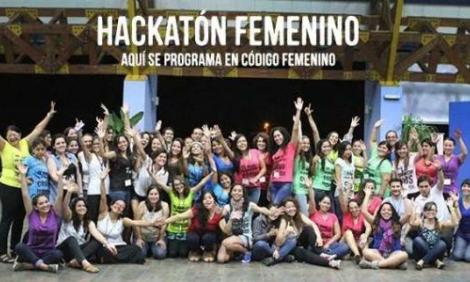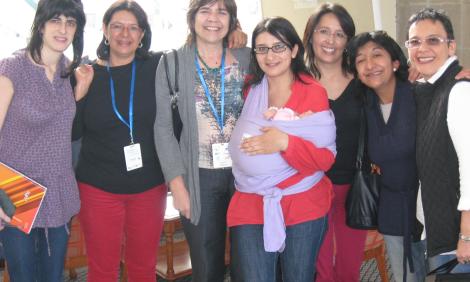
Editorial
[EDITORIAL] How Internet Technology Will Affect Rights: 3 Things to Look For
Economic, social, cultural rights in international law is a recognition of the basic rights of all people to a fundamentally decent and happy life - one in which their right to self-determination is respected. Does the progressively digitised future threaten or cement a world where ESC rights are guaranteed for all? In this editorial, Nadine Moawad states that the network is good and the network…

In depth
At the cutting edge: TBTT campaigner Francoise Mukuku in DRC
When the TBTT campaign took off in Democratic Republic of Congo, there were few takers. Women rights' activists combatting VAW didn't understand the role ICTs could play in either propagating violence, or in activism. Now other Francophone countries approach SJS to learn more about the ways in which this cutting edge campaign is changing conversations around technology related VAW and reclaiming…

Publication
Mobile Phone: A Public Tool (Civic Participation, Education and Health)
This study led by Digital Empowerment Foundation analyses 14 projects that are active in India in the arena of civic participation, education and health, and examines its impact on women stakeholders. One of the objectives is to understand how mobile phones are benefiting women frontline workers (teachers, auxiliary nurses) and mothers; however, the study's main findings are that accessibility…
Publication
The 2015-16 Affordability Report
The 2015-16 Affordability Report looks at the affordability environment across 51 countries, considers the effects of poverty and income inequality and takes a close look at gender inequality in access to the internet. A4AI considers that the connectivity lag will undermine global development across the board, contributing to lost opportunities for economic growth and denying hundreds of millions…

Publication
Hacking exclusion: African feminists engagements and disruption of the internet
An important connection between women's rights activism and building
movements of solidarity and resistance, is communication. The internet is a fundamental and potentially transformative public space which can enable and facilitate communication at speed, across borders and through time and space. It is a stage for violences that are familiar to feminists living and resisting in spaces…
movements of solidarity and resistance, is communication. The internet is a fundamental and potentially transformative public space which can enable and facilitate communication at speed, across borders and through time and space. It is a stage for violences that are familiar to feminists living and resisting in spaces…
Publication
Through the 'information society' prism: Scoping gender equality for the post-2015 agenda
The emergent information or network society context offers a range of opportunities for women and girls to enhance their participation across economic, socio-cultural and public-political realms of life, as well as the scope for enhancing their individual freedoms. The Post-2015 agenda therefore, both in terms of goals and related targets and indicators, has to promote and measure women's…

In depth
Participants in Costa Rican Women's Hackathon develop software applications to solve social problems
On 30 and 31 August 2014, 39 women engineers and technologists created nine prototypes of software applications aimed at solving social problems in the north of Costa Rica, at the First Women's Hackathon, organised by APC member organisation Sulá Batsú through its TIC-AS project, with the support of UN Women's Fund for Gender Equality.
Publication
Implicating mobile phones in violence against women: What’s gender got to do with it?
This paper gives an analysis of women and men’s differential access and use of the mobile phone and how through it gender stereotypes are reinforced. During a four year study in Zambia, it emerged that although there were clear advantages that have come as a result of mobile phones some negative social impacts which reinforce gender stereotypes and power relations and subsequently result in…

In depth
Latin America in the run-up to the IGF: global and regional synergy
The Association for Progressive Communications (APC), NUPEF and the Registry of Internet Domain Names for Latin America and the Caribbean sponsored the Third Regional Preparatory Meeting for the Internet Governance Forum (IGF), held in Ecuador in early August 2010. How might this regional meeting and the IGF impact each other? What recommendations and concerns emerged from the regional process?…
Publication
APC Brief on the Fifth Internet Governance Forum
The Internet Governance Forum is a platform for multi-stakeholder policy dialogue on internet governance, that emerged from the second phase of the World Summit on the Information Society (WSIS). In this document, APC presents in brief some of the most pressing issues to be debated in the IGF's fifth year of existence.




